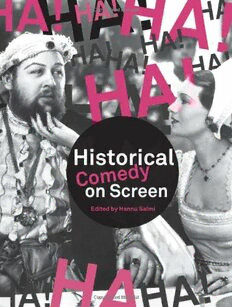
Historical Comedy on Screen PDF
Preview Historical Comedy on Screen
Historical Comedy on Screen Historical Comedy on Screen Subverting History with Humour Edited by Hannu Salmi intellect Bristol, UK / Chicago, USA First published in the UK in 2011 by Intellect, The Mill, Parnall Road, Fishponds, Bristol, BS16 3JG, UK First published in the USA in 2011 by Intellect, The University of Chicago Press, 1427 E. 60th Street, Chicago, IL 60637, USA Copyright © 2011 Intellect Ltd All rights reserved. No part of this publication may be reproduced, stored in a retrieval system, or transmitted, in any form or by any means, electronic, mechanical, photocopying, recording, or otherwise, without written permission. A catalogue record for this book is available from the British Library. Cover Image: The Private Life of Henry VIII (1933), ITV Studios Global Entertainment. Cover designer: Holly Rose Copy-editor: Rebecca Vaughan-Williams Typesetting: Mac Style, Beverley, E. Yorkshire ISBN 978-1-84150-367-7 / EISBN 978-1-84150-522-0 Printed and bound by Gutenberg Press, Malta. Contents Chapter 1: Introduction: The Mad History of the World 7 Hannu Salmi, University of Turku PART I: Comedians and Comic Representations 31 Chapter 2: Buster Keaton’s Comedies of Southern History: Our Hospitality and The General 33 Susan E. Linville, University of Colorado Denver Chapter 3: Comedians and Romance: History and Humour in Kalabalik 53 David Ludvigsson, University of Uppsala Chapter 4: From Ideal Husbands to Berserk Gargoyles: A Survey of Period Comedies Representing the British Past in the 1950s and 1960s 79 Harri Kilpi, University of Helsinki Chapter 5: Forms of History in Woody Allen 101 Maurice Yacowar, University of Calgary PART II: No Laughing Matter 111 Chapter 6: No Laughing Matter? Comedy and the Spanish Civil War in Cinema 113 David Archibald, University of Glasgow Chapter 7: A Killer Joke? World War II in Post-War British Television and Film Comedy 129 Rami Mähkä, University of Turku Chapter 8: ‘ Holocaust-Nostalgia’, Humour and Irony: The Case of Pizza in Auschwitz 153 Hagai Dagan, Sapir College Chapter 9: Comedy and Counter-History 175 Marcia Landy, University of Pittsburgh Index 199 Chapter 1 Introduction: The Mad History of the World Hannu Salmi, University of Turku ‘H istory is about the most cruel of all goddesses’, wrote Friedrich Engels in 1893, ‘she leads her triumphal car over heaps of corpses, not only in war, but also in “peaceful” economic development’ (cit. Carr 1961: 105). In Engels’s view, history is a cruel tragedy, and the conception of history as something profoundly tragic has made our image of the past grim and joyless. Although one might assume there would be plenty of amusement to be found in the past, historians rarely laugh at the objects of their study. The same can be said for historical films: there is no doubt that the majority of filmed portrayals of the past paint a sombre tone. Examples from the past decades include such films as Oliver Hirschbiegel’s Der Untergang (Downfall, 2004), Roland Emmerich’s The Patriot (2000), Ridley Scott’s The Gladiator (2000) and Luc Besson’s The Messenger: The Story of Joan of Arc (1999). While the past is always noble and majestic, it is, first and foremost, tragic. This linking of history and tragedy can be traced far back into the history of Western civilization. While the tragedians Euripides, Sophocles and especially Aeschylus wrote exclusively about an ancient era of heroic deeds, the comic playwright Aristophanes found his subject matter in everyday life and politics. The contemporary environment of the author’s audience was considered more appropriate raw material for merriment than the past. Methods of characterization would also vary in tragedy and comedy. In the Poetics, Aristotle considered tragedy – like the epic – ‘an imitation in verse of characters of a higher type’, while comedy would mainly portray ‘characters of a lower type’ (1449a, 30–35; 1449b, 5–10). Because we normally have no reason to laugh at human beings suffering from ethical dilemmas, the overall tone of tragedies is therefore serious. Aristotle does not appear to have had a particularly favourable opinion of satirists and comic authors. In the Rhetoric, for example, he calls them ‘evil-speakers and tell-tales’ (1384b, 10–15). Ancient Greek notions of gravitas and ridiculousness, the tragic and the comic, are so deeply ingrained that they still affect our ways of imagining and portraying the past. Filmmakers – like historians – have no desire to appear as ‘evil-speakers’ when it concerns history and those who are no longer with us. Nevertheless, films do manage to laugh at the past surprisingly often. This collection of essays is devoted to exploring this comic treatment of history on screen. Only little has been written on historical comedy so far. This book aims at offering new insights and openings on this rarely discussed theme, not only on historical comedy as a generic entity but, more broadly, on the role of the comic in the audiovisual representation of the past. The first part of the book deals with comedians and comic representations: Susan E. Linville analyses Buster Keaton’s silent comedies on Southern history, especially 9
